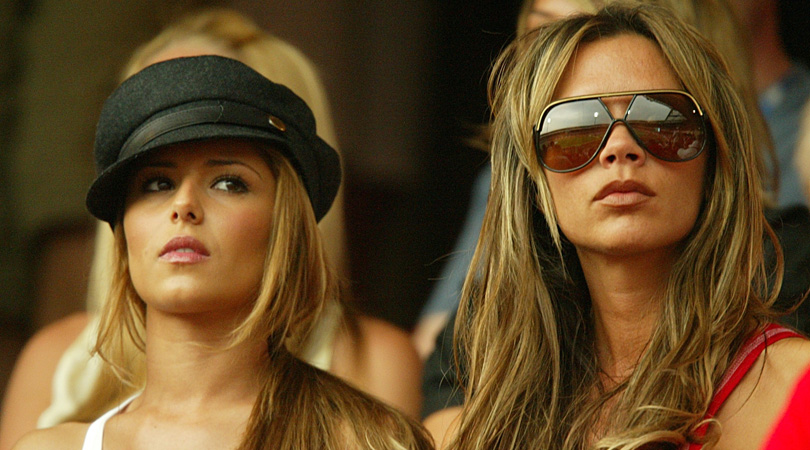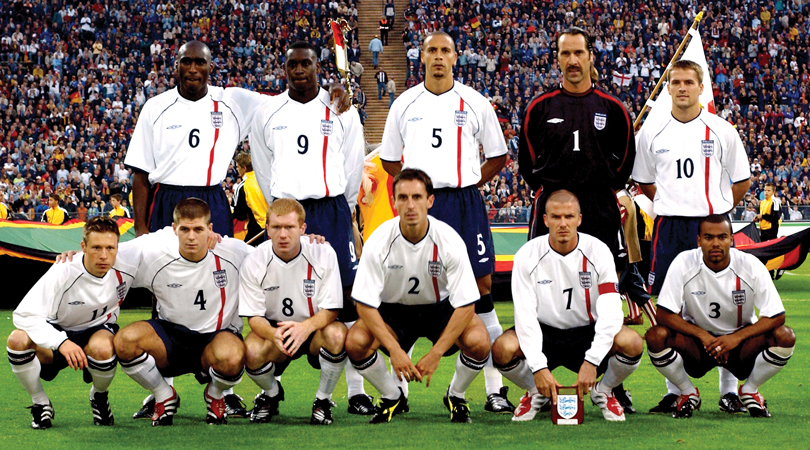
Rudi Voller didn’t see it coming. Germany led England by six points in qualification for the 2002 World Cup – it looked all over. During the month reserved for the play-offs, Germany’s head coach had already arranged friendlies against South Korea and Thailand in preparation for the tournament itself.
“I expect us to go through directly,” he stated, confidently. “If England go to the play-offs, I will keep my fingers crossed for them.”
Germany were about to host Sven-Goran Eriksson’s side at Munich’s Olympiastadion, and Voller’s confidence was natural: Die Mannschaft had beaten England 1-0 in that rain-sodden last game at Wembley. In their most recent outing, they had thrashed Hungary 5-2 – leaving the German press to laud ‘the Sebastian Generation’: a crop of emerging stars led by the highly-rated Sebastian Deisler.
The Three Lions, by contrast, had just been outclassed in a 2-0 home friendly defeat to the Netherlands – a team that wouldn’t even reach the forthcoming World Cup. In Germany’s entire history, they had lost only one World Cup qualifier – a 1-0 reverse to Portugal in 1985 with their spot in Mexico already secured.
“England are not dreaming of scoring lots of goals,” suggested Bayer Leverkusen centre-back Jens Nowotny. “They will be very defence-orientated.”
How wrong he was. When Germany went 1-0 up after six minutes through Carsten Jancker, they seemed set to mathematically confirm their qualification that evening. But then they were hit by arguably the most astonishing Three Lions display ever. On September 1, 2001, the Golden Generation was born.
David Beckham, Michael Owen, Rio Ferdinand, Gary Neville, Steven Gerrard, Ashley Cole, Paul Scholes. All came together to tear Germany apart – Owen with a hat-trick, before Emile Heskey slid home to seal a sensational victory.
“It’s hard to put into words how I felt when I scored the fifth goal,” Heskey told FourFourTwo. “It was so crazy. That’s the game that people still stop me in the street about. Germany had humiliated us in our garden, but we’d taken it back to them. We’d gone into theirs and won 5-1. We had some wonderful players, and everything just clicked."
The start of the Golden Generation
“That game was the start of the Golden Generation,” continues the former Leicester City and Liverpool frontman. Manchester United were winning the Treble around that time, and the nucleus of the side was English players. We had stars, big names.”
Soon they would be accompanied by Frank Lampard, John Terry and Wayne Rooney, but they had already made the world sit up and take notice.
“I’ve never seen a better England side,” said Franz Beckenbauer – and he had played against one that won the 1966 World Cup Final. Arsene Wenger tipped Eriksson’s men for potential glory in Japan and South Korea. “I can see them as champions,” he asserted.
“There was this feeling of hope,” Henry Winter, chief football writer at The Times, explains to FFT. “Germany had always been the yardstick for England. I went into a bar after that game, and German fans were applauding the England fans.”
Germany had to cancel their November jaunt to Asia, because they were otherwise occupied in a World Cup play-off with Ukraine. Thanks to Beckham’s 93rd-minute free-kick against Greece at Old Trafford, the Three Lions had topped the group on goal difference.
The 93rd minute at Old Trafford, 19 years ago.David Beckham covered 16.1km during that game before he took this free-kick... 🤯🤯🤯https://t.co/fdyU02ryGG pic.twitter.com/Hgx69p2PNuOctober 6, 2020
After his controversial appointment as England’s first foreign coach in January 2001, ex-Benfica, Roma and Lazio boss Eriksson’s first year in charge had won over the critics.
England had been unable to get out of their group at Euro 2000, but the placid Swede had given the players licence to attack and show off their undoubted talents, while improving them tactically. Predecessor Kevin Keegan had focused little on tactics, even falling asleep during a squad meeting on the subject.
“Sven’s CV spoke for itself, so he gathered respect within the dressing room straight away,” says Heskey. “He was very organised. When we went on the pitch, everyone knew their job and I enjoyed that – then on top of that, you could be spontaneous when you received the ball. We were prepared for what the opposition were going to throw at us.”
Wembley’s closure meant England took home matches around the country, which in itself brought enthusiasm that perpetual fixtures at the national stadium rarely did. Between 2001 and 2004, games were played at Old Trafford, Anfield, Pride Park, St James’ Park, Elland Road, St Mary’s, Upton Park, the Stadium of Light, the Riverside Stadium, Villa Park, the City of Manchester Stadium, Leicester’s Walkers Stadium and even Ipswich Town’s Portman Road.
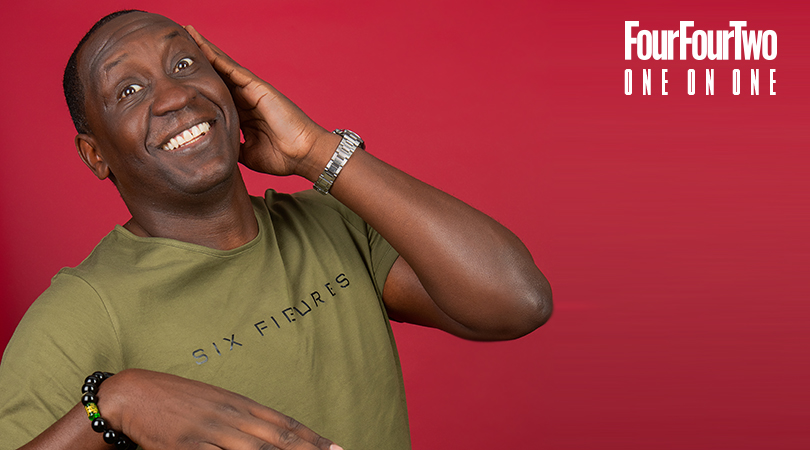
THE BIG INTERVIEW Emile Heskey – “I wouldn’t say England was toxic, but it could be very intimidating”
Gerrard and Gary Neville missed the 2002 World Cup through injury, but Beckham battled back from a broken metatarsal – converting his penalty against Argentina to banish the ghosts of 1998.
“We were in the Group of Death – we had to beat Argentina,” recalls Danny Mills, who started every match of that tournament in Neville’s absence. “The game was spiteful, after what had happened four years earlier with Diego Simeone and Beckham. Argentina were among the favourites for the tournament, but our game plan was so meticulous.
“Every single Argentina player refused to swap shirts afterwards, and there was spitting going on. When we got back to the dressing room, it just erupted – all of those players who’d had frustrations from 1998. Even Sol Campbell, who was generally pretty reserved, was shouting and screaming. Emotions poured out.”
Racing into a 3-0 half-time lead against Denmark in the last 16, the Three Lions were on their way to a quarter-final meeting with Brazil.
“We were playing quite well – you start to think, ‘If we beat Brazil, we could win the World Cup’,” admits Mills. “You start giggling to yourself, thinking, ‘No, surely not... I might receive a knighthood!’ You get silly about it. But the Brazil game didn’t go our way.”
Despite being hampered by a hamstring injury, Owen put England in front after 23 minutes, only for Rivaldo to level in first-half injury time. When Ronaldinho’s free-kick embarrassed David Seaman, England’s dreams were over – even though the match-winner was sent off with more than half an hour remaining.
“Even with 10 men, they kept the ball better than us,” laments Mills. “It was 38 or 39 degrees, and we were exhausted. I was so dehydrated afterwards that it took me three and a half hours to have a wee in the drugs testing room. It was me, Rio, Ronaldinho and Cafu sat in a room together. Ronaldinho was messing about, laughing and joking – I was thinking, ‘I’m going to smack him in a minute’.”
For Heskey, the Brazil defeat in Shizuoka stands as a reminder that however talented England were, they could never have been expected to dominate tournaments during that era.
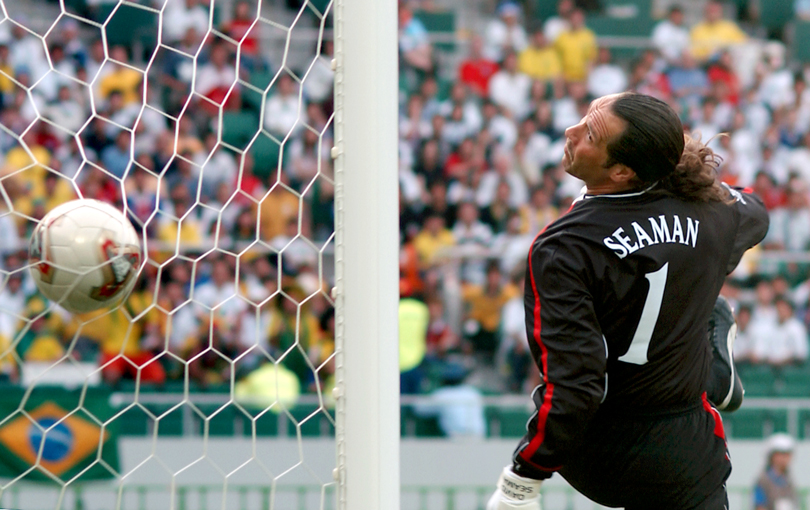
Dressing room divisions
“We talk about the Golden Generation, but I believe France had the Golden Generation,” he claims.
“Just in my age group, they had Henry, Anelka, Trezeguet, Gallas, Silvestre and Sagnol – then you add Zidane, Vieira, Petit, Desailly, Thuram, Barthez and Lizarazu. So who really had the Golden Generation?
"That Brazil team in 2002 had Rivaldo, Ronaldo and Ronaldinho – three Ballon d’Or winners up front.”
More frustrating was the fact that Brazil’s opponents in the final would be Germany – the team England had thrashed less than a year earlier.
The Three Lions would soon be boosted by the arrival of a teenage Rooney, however, and a place at Euro 2004 was theirs if they avoided defeat in their last qualifier against Turkey in Istanbul. Then came the mother of all media storms.
A month earlier, Ferdinand had missed a drugs test scheduled to take place at Manchester United’s Carrington training ground. Forgetting the appointment, he went shopping instead, before passing the test a day later.
With an investigation ongoing, the FA excluded him from the squad to face Turkey. United team-mate Gary Neville encouraged his England team-mates to go on strike if the central defender was not immediately restored to the side.
“You’re being judge and f**king jury,” Neville told Mark Palios, who had recently taken over as FA chief executive following Adam Crozier’s departure. “You’ve come in and wanted to make a point for yourself, the new sheriff in town.”
At Sopwell House in St Albans, the squad’s base before travelling to Istanbul, the Turkey match and England’s place at Euro 2004 began to look in real doubt. Players were called into a meeting.
“At that stage, no one really knew what had gone on,” reveals Mills, “but Neville spoke and said, ‘The FA aren’t allowing Rio to play – he has missed a drugs test; he’s failed to have a p**s, that’s all it is’. The next morning, there was another meeting. The Manchester United players stood up, led by G-Nev, and called for strike action.
“I was like, ‘Go on strike? What, not play for our country? Why?’ Rio had done something wrong. Gary got up and said, ‘We’re all going to vote – are we going on strike, yes or no? Everyone put your hands up’.
“That made me incredibly uncomfortable. There were a lot of young lads in the squad. A few players put their hands up, but I think Gary’s words were, ‘Whatever you lot decide, us Man United players are going on strike’.
"A few more people put their hands up, but the others were looking around. I said, ‘Hang on Gaz, this is not right – you can’t have a vote like this, with guys under immense pressure – you need to do it properly so they can have their say and not be vilified for it’.
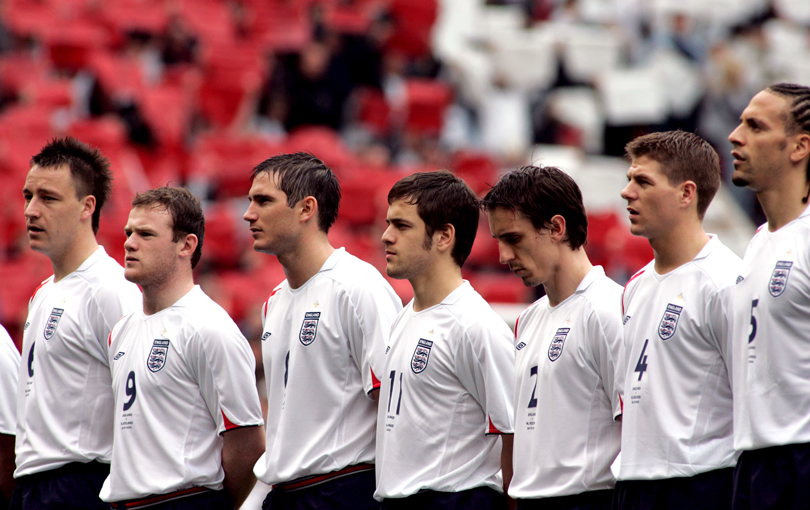
“He mumbled and grumbled, said, ‘OK’, then everyone went out and wrote yes or no on a piece of paper. The news came out the next day, and I think Gary said it was unanimous to go on strike. I can guarantee that was not the case. It really annoyed me – I’d voted not to because I didn’t believe it was the right thing to do, and Rio was in the wrong. How badly he was in the wrong was irrelevant.”
Even Ferdinand himself wasn’t that keen on the strike threat. “I felt uncomfortable,” he later told FFT. “It was a nice gesture, but it was my problem and I didn’t want them to sacrifice anything on behalf of me.”
“It was a massive story,” says Henry Winter. “But with England, you always find a little bit of comedy amid the chaos. A couple of old ladies had gone into Sopwell House for a sherry, and one of them said, ‘Look, it’s that nice Michael Owen’, so they asked Owen and David Beckham for autographs. There was absolute carnage going on around them – headlines like ‘Traitors’ and ‘You’ve Let Your Country Down’ – but there they both were, being incredibly nice and polite to two ladies from the sherry-drinking bridge club.”
Only a call from Sir Alex Ferguson – worried the media backlash would affect his players’ club form – talked Neville out of striking.
“We were getting slaughtered in the press, and rightly so,” says Mills. “In the end they didn’t go on strike, did they? They caved and played. It was all for nothing – we played the game, got through to the Euros and Rio got banned.”
That the situation had been driven by the Manchester United players in the squad was perhaps symptomatic of the club divides between the top Premier League teams in that era. Heskey believes much of it was down to human nature.
“If me and you are from Liverpool and we go into the England squad, I’m going to sit with you,” he says. “Sure, everyone will train together, but most of the time I’ll be with you. It was just like that. I don’t think we particularly meant to do it, but the rivalry was very fierce back then – and there weren’t only two teams involved, but a few.
“With social media now, they’re more connected. We weren’t back then – I wouldn’t call up Rio or Frank and say, ‘Hi, what are you up to?’ Now, regardless of which club they’re from, they message each other and have some banter.”
Not so golden after all
At Euro 2004, things looked promising when England beat Croatia 4-2, then led hosts Portugal three minutes into their Lisbon quarter-final.
However, it all fell apart when Rooney hobbled off injured after half an hour – referee Urs Meier controversially disallowed Campbell’s header, then Beckham was thwarted by an exploding penalty spot during the shootout. Darius Vassell’s miss confirmed defeat.
Despite boasting a midfield quartet of Beckham, Lampard, Gerrard and Scholes, England couldn’t find a way to dominate without Rooney. Utilised out of position on the left as Eriksson insisted on sticking to his 4-4-2 formation – disregarding the difficulties of that Lampard-Gerrard partnership in the centre – Scholes retired from international football the next day, at 29.
“Maybe that’s the window into the failure of the Golden Generation,” says Winter. “Scholes was the best player in that squad. If you’ve got a talent like him, you should be lifting trophies, but he resigned on the plane coming home from Portugal.”
Without him, England were stunned by Northern Ireland in qualifying for the 2006 World Cup, as off-field difficulties returned. Previously in the headlines for a tryst with Ulrika Jonsson, this time Eriksson’s love life embroiled Palios too: both were reported to have had relationships with FA secretary Faria Alam, and Palios resigned.
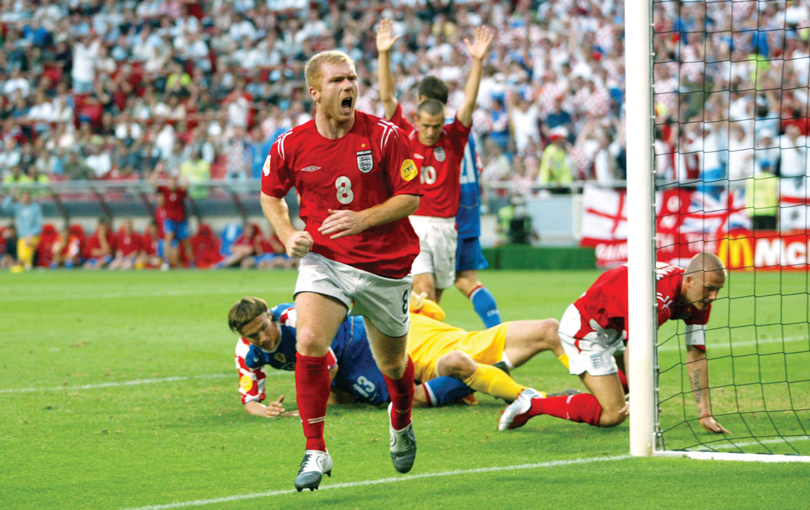
The mood didn’t improve at the World Cup: England never found top gear in Germany, surprise inclusion Theo Walcott didn’t play a minute, and media focus switched to the antics of the WAGs in Baden-Baden.
“The whole thing was a circus,” remembers Winter. “The media were utterly obsessed with the WAGs. Personally, I wasn’t that interested – I was staying in their hotel and thought, ‘This is going to be chaos’, so went and checked into another hotel.
"The culture was wrong, but the press shouldn’t get off completely scot-free. Maybe we were reflecting the public’s interest in celebrities at the time, or maybe we added to it. Either way, it created a distraction.”
It exacerbated tensions between press and players, there for much of the decade. “There was always going to be pressure from the media, and you had to deal with it,” admits Heskey. “I don’t think they meant to be negative, but it was negative.”
For some, it was in their head before games had even started.
“I remember talking to one player about the excitement of standing in the tunnel, going out to represent your country,” continues Winter. “He said that all he could think about was the press, and what rating he was going to get in the paper.”
Frustrated as he tried to find form after injury, Rooney was sent off in the quarter-final against Portugal, then a shootout hurt England again – Lampard, Gerrard and Jamie Carragher all missed, the latter brought on as a 119th-minute substitute to take a spot-kick. “I’d done so well in training – I hadn’t missed in five weeks,” sighed the defender.
'The Wally With The Brolly'
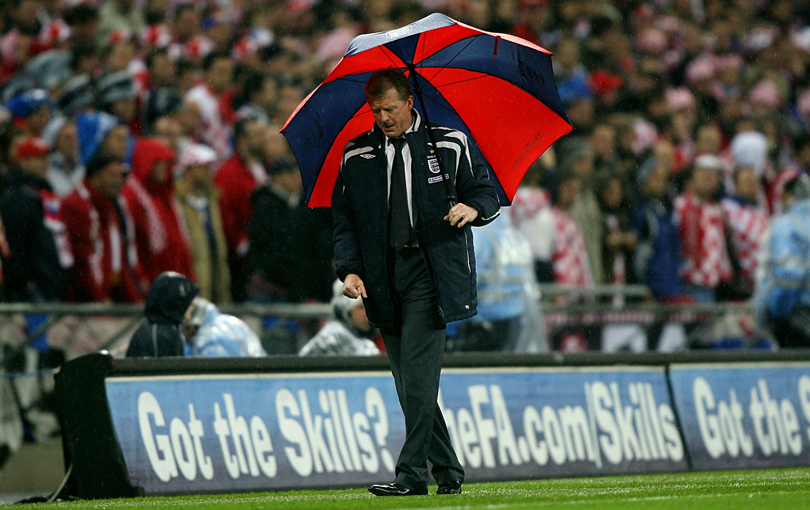
If three consecutive quarter-final losses was seen as a failure, things got worse when Steve McClaren took over – despite the appointment of Terry Venables as his assistant.
England lost in Zagreb and Moscow, but a draw at home to Croatia would still have sent them to Euro 2008. They lost, and the man nicknamed ‘Wally With The Brolly’ was gone.
Unbelievably, the Golden Generation had failed to qualify for a major tournament – even if many of them didn’t start that showdown with Croatia. Rooney, Owen, Terry and Neville were injured, Ferdinand was suspended after two yellow cards, Cole was left out for Wayne Bridge, while Beckham was a half-time substitute – dropped from the squad at the start of qualifying, then awkwardly recalled to the line-up, then benched for that decisive fixture.
“Some players thought that by dropping Beckham, he was just trying to show, ‘I’m the big man, I can drop the biggest player’ – like going to a new school and taking on the biggest guy on the playground,” says Winter. “You soon sensed that the players didn’t really rate McClaren. He was a crazy choice as manager. A great coach, but not a manager.”
A decade that had started with such hope was ending in complete fiasco. The Golden Generation tag – reported to have been first coined by Adam Crozier in his time at the FA – had become a stick to beat the players with; a reminder of unfulfilled potential.
“The Golden Generation thing is frustrating,” said Lampard in 2009. “We didn’t make it up, Crozier did. The Golden Generation should only be said once you’ve won something. It was said too early about us. By calling us that, it was almost as if people were waiting for us to fail.”
Sadly, fail they did, in their ultimate goal of lifting a trophy.
🇧🇷 On this day 2002 Ronaldinho lobbed David Seaman from a free-kick and knocked England out of the World Cup. We were watching on a tv with wheels in a school assembly hall. There may have been tears. The big question remains: did he mean it? pic.twitter.com/GO6kzHOfwYJune 21, 2019
“With all the players we had, we were more than capable of winning something,” reflects Heskey. “But we ran into some teams who were better organised and more together.”
“Tactical decisions, issues with the media, the intensity of the season – they inhibited the Golden Generation,” concludes Winter. “They were less than the sum of their considerable parts.
"England could have won Euro 2004. The 2006 World Cup was frustrating, too. Players were just exhausted after long seasons – Michel Platini said that English players were lions in the winter and lambs in the spring. It was true.
“I just feel sad that a nice bunch of people didn’t achieve what they could have done. If they’d been tossers I wouldn’t have had sympathy, but they were nice lads and I know it hurt – they carry it with them.”
When Germany were dismantled 5-1 in Munich, it seemed like the noughties would be the decade when England finally won something, for the first time since 1966. Instead, it proved to be a decade of what might have been.
This piece first appeared is FourFourTwo in November 2020. Get the latest issue of FourFourTwo now!
